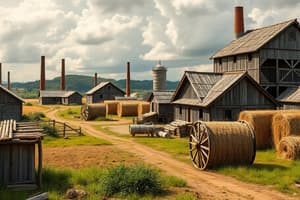Podcast
Questions and Answers
What role did profound imbalances in wealth distribution play in igniting the Haitian Revolution?
What role did profound imbalances in wealth distribution play in igniting the Haitian Revolution?
It ignited the revolution
How did the legacies of prior conflicts contribute to future unrest?
How did the legacies of prior conflicts contribute to future unrest?
The legacies perpetuated tensions and fostered distrust towards ruling bodies
What impact did the European scientific and philosophical Enlightenment have on marginalized peoples?
What impact did the European scientific and philosophical Enlightenment have on marginalized peoples?
Empowered them to assert greater control over their lives
How have new technologies, particularly in communication, influenced revolutionary movements?
How have new technologies, particularly in communication, influenced revolutionary movements?
What major historical event prompted the French Revolution partially in response to financial burdens?
What major historical event prompted the French Revolution partially in response to financial burdens?
What emerged in the aftermath of the American Revolution calling for enhanced legal protections?
What emerged in the aftermath of the American Revolution calling for enhanced legal protections?
What role do protracted inequalities play in fueling revolutions?
What role do protracted inequalities play in fueling revolutions?
How did British policies like 'taxation without representation' contribute to the American Revolution?
How did British policies like 'taxation without representation' contribute to the American Revolution?
What role did centuries of French domination and exploitation play in the Algerian Revolution?
What role did centuries of French domination and exploitation play in the Algerian Revolution?
How did fluctuations in economies and inequitable distribution of resources contribute to revolutionary fervor?
How did fluctuations in economies and inequitable distribution of resources contribute to revolutionary fervor?
What impact did the industrial revolution in England have on labor markets and traditional agrarian societies?
What impact did the industrial revolution in England have on labor markets and traditional agrarian societies?
How do revolutions signal the beginnings of organized opposition and collective action?
How do revolutions signal the beginnings of organized opposition and collective action?
Flashcards are hidden until you start studying
Study Notes
Understanding Revolutions: Exploring Their Roots
Revolutions shape history as they challenge existing power structures and inspire profound societal transformations. To comprehend why revolutions occur, we must delve into the intricate web of interconnected factors that fuel their emergence.
Protracted Inequalities and Discontent
One common thread across numerous revolutions is oppression and grievances borne from socioeconomic disparities. As communities experience systematic injustices, disillusionment takes root, and calls for reform escalate over time.
For instance, during the American Revolution, British policies such as taxation without representation generated deep resentment, leading colonists to demand self-governance and freedom from tyranny. Similarly, the Algerian Revolution stemmed from widespread frustration resulting from centuries of French domination and exploitation.
Economic Conditions and Resource Allocation
Fluctuations in economies coupled with inequitable distribution of resources often serve as catalysts for revolutionary fervor. When certain segments of the population suffer due to mismanagement or excessive extraction, the potential for instability increases.
As an illustration, the industrial revolution in England spurred massive shifts within labor markets, upsetting traditional agrarian societies. These upheavals frequently invoked resistance, signaling the beginnings of organized opposition and collective action. Likewise, the Haitian Revolution, ignited by profound imbalances in wealth distribution and ensuing disaffection, resulted in the establishment of the first independent black state in the Western hemisphere.
Historical Context and Legacies of Previous Conflict
Historically fraught circumstances provide fertile ground for future unrest. The legacies of prior conflicts—such as wars, colonization, social unrest, or natural disasters—can reverberate throughout generations, perpetuating tensions and fostering distrust towards ruling bodies.
Consider, for example, how World War II gave rise to the Russian Revolution, as communist idealisms filled the vacuum following the collapse of czarist Russia. Moreover, the French Revolution emerged partially in response to the Seven Years' War and the French and Indian Wars, both of which placed immense financial burdens upon France.
Systemic Oppressions and Resistance Movements
Populations subjected to systemic forms of abuse, such as slavery or gender inequality, may develop grassroots movements aimed at challenging those norms and attaining emancipation. In some instances, these efforts may grow into full-scale rebellions.
For instance, the European scientific and philosophical Enlightenment prompted a shift away from hierarchical thinking, thereby empowering marginalized peoples to assert greater control over their lives and destinies. Additionally, the Female voices emerging in the aftermath of the American Revolution called for enhanced legal protections based on equal rights and recognition.
Technology and Communication Advances
New technologies, particularly in communication, facilitate the rapid dissemination of information and coordinated actions. By providing access to a broader range of perspectives and amplifying dissenting viewpoints, technological advancements heighten awareness of social justice concerns and galvanize support behind revolutionary causes.
Throughout history, innovations like the printing press, telegraph, radio, and internet have all bolstered grassroots activism, aligning public sentiment and enabling coalition building.
By examining each of these causal factors individually, we gain insight into the complex dynamics underlying revolutions. However, understanding the interactions among these elements and their cumulative influence provides us with a deeper appreciation for the forces driving societal transformation.
Studying That Suits You
Use AI to generate personalized quizzes and flashcards to suit your learning preferences.





